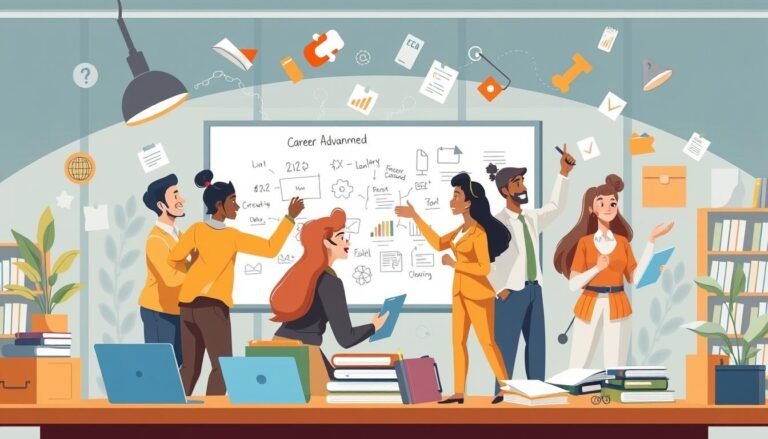Boost Your Deductive Skills: Unlock Your Potential
Ever wondered how Sherlock Holmes solves mysteries so easily? His secret is his sharp deductive skills. But can you get this power too?
Deductive skills are key to logical thinking and solving problems. They’re not just for TV detectives. These skills are vital for making decisions in our daily lives. By improving your deductive skills, you’ll make better choices and overcome challenges more easily.
In today’s fast world, being able to make accurate conclusions from facts is crucial. Whether at work or in personal life, strong deductive skills can be your edge. Let’s see how you can unlock this potential and sharpen your mind.
Key Takeaways
- Deductive skills are essential for logical reasoning and problem-solving
- Developing these abilities enhances decision-making in various aspects of life
- Critical thinking and deductive reasoning go hand in hand
- Practical exercises can help improve your deductive skills
- Applying deductive reasoning in daily life leads to better outcomes
Understanding Deductive Skills: The Foundation of Logical Reasoning
Deductive skills are key to logical reasoning. They let us make specific conclusions from general ideas. This is vital for critical thinking and solving problems. Let’s look into deductive reasoning and its importance in our daily lives.
Defining Deductive Reasoning
Deductive reasoning is a strict logic type that goes from general ideas to specific outcomes. It’s the most certain type of reasoning, beating inductive reasoning. In formal logic, it involves using symbols and signs to get valid conclusions.
The Role of Deductive Skills in Critical Thinking
Critical thinking and deductive reasoning work together. Using deductive skills means checking if arguments and evidence are valid. This improves our analytical skills and helps us make better decisions.
- 91% of candidates value user-friendly platforms for logical reasoning tests
- 75% appreciate comprehensive assessment designs
- 65% feel such tests effectively evaluate analytical skills
Deductive vs. Inductive Reasoning
Deductive reasoning goes from general to specific. Inductive reasoning starts with specific facts and moves to broader ideas. Some say inductive reasoning is just a part of deductive logic.
| Aspect | Deductive Reasoning | Inductive Reasoning |
|---|---|---|
| Direction | General to Specific | Specific to General |
| Certainty | High | Moderate to Low |
| Application | Structured Problems | Complex, Ambiguous Situations |
Knowing these differences helps us develop better analytical skills. It also helps us choose the right reasoning approach for different situations.
The Power of Deductive Reasoning in Problem-Solving
Deductive reasoning is key in solving problems in many fields. It helps experts break down tough issues into simpler parts. This leads to better solutions.
In law, 75% of lawyers say deductive reasoning is vital for making decisions. They use it to look at facts, apply laws, and draw logical conclusions. In healthcare, 83% of doctors say this skill helps them solve problems.
Deductive reasoning helps more than just traditional fields. In tech, companies that focus on this skill see a 62% boost in success. This shows how thinking analytically can lead to big advances.
“Deductive reasoning is the compass that guides us through the maze of complex problems to find the most logical solution.”
Financial firms that teach deductive reasoning have a 45% edge over those that don’t. This shows the worth of training in these skills for better performance and decision-making.
- Construction sector: 59% improvement in project completion rates
- Marketing industry: 21% higher promotion rates for individuals with strong deductive skills
- Consulting: 90% of top executives cite deductive reasoning as key in strategic decisions
These facts show how deductive reasoning changes problem-solving in many areas. By improving this skill, experts can tackle challenges better. This leads to more effective and creative solutions.
Developing Your Deductive Skills: Practical Exercises
Improving your deductive skills is key for success in many areas. These skills are crucial in solving problems and making decisions in fields like law and science. Let’s look at some exercises to boost your logical thinking and cognitive abilities.
Syllogism Practice
Syllogisms are great for improving logical thinking. They let you draw conclusions from given premises. For instance:
- All cats have fur
- Fluffy is a cat
- Therefore, Fluffy has fur
Doing syllogisms regularly can make you better at logical thinking. It also sharpens your deductive reasoning skills.
Analyzing Legal Cases
Lawyers use deductive reasoning a lot when they look at legal cases. This isn’t just for lawyers; it can help anyone improve their thinking skills. Try to study important court decisions and understand the logical arguments.
Pattern Recognition Games
Playing pattern recognition games can boost your deductive skills. These games test your ability to spot logical patterns and predict what comes next. Sudoku, chess, and sequence puzzles are good places to start.
| Exercise | Skill Improved | Benefit |
|---|---|---|
| Syllogism Practice | Logical Thinking | Enhanced Inference Making |
| Legal Case Analysis | Deductive Reasoning | Improved Argument Evaluation |
| Pattern Recognition Games | Cognitive Skills | Better Problem-Solving Abilities |
Adding these exercises to your daily routine will help improve your logical thinking and cognitive skills. Remember, regular practice is essential for getting better at deductive reasoning.
Applying Deductive Skills in Everyday Life
Deductive skills are key in our daily lives. They help us make smart choices and reach our goals. By using logical thinking, we can solve problems better and connect with others more effectively.
Decision-making Processes Enhanced by Deductive Reasoning
Deductive reasoning makes decision-making better. It starts with broad principles and ends with clear conclusions. For instance, in finance, it helps pick investments by looking at market trends and company performance.
Using Deductive Skills for Effective Goal Setting
Setting goals is more effective with deductive skills. By breaking big goals into smaller steps, we have a clear plan. This lets us see hurdles and plan how to get past them.
Improving Personal Relationships through Logical Communication
Logical communication, based on deductive reasoning, makes relationships stronger. It means sharing thoughts clearly and listening well. This skill is great for solving conflicts and finding solutions that work for everyone.
| Area of Application | Benefit of Deductive Skills |
|---|---|
| Decision-making | More informed choices |
| Goal setting | Clear, actionable steps |
| Communication | Reduced misunderstandings |
Using deductive skills every day makes us better in many areas. It helps in making big decisions, setting goals, and building strong relationships. Logical thinking leads to better results in all these areas.
The Science Behind Deductive Skills and Cognitive Development
Deductive skills are key to growing our minds. As we get older, these skills get better. Knowing how our brain works with deductive reasoning helps us think better and learn more.
Research shows a link between social class and thinking skills. Kids from lower social classes might use their brains differently for schoolwork. This can cause big differences in reading by the time they’re in fifth grade.
Studies using brain scans show that social class changes brain structure. Kids from lower social classes have less gray matter in areas needed for language. These differences start early, with language gaps seen as young as 18 months old.
How parents are educated also affects kids’ deductive reasoning. Kids with parents who went to college use more brain areas for this skill. This shows how our environment and brain development are connected.
| SES Factor | Impact on Cognitive Skills |
|---|---|
| Lower SES | Greater reliance on visuospatial brain systems |
| Higher SES | Better language comprehension and production |
| Parental Education | Increased use of left inferior frontal gyrus for deduction |
Knowing these facts can help us make better strategies to improve thinking skills for everyone. By tackling these issues, we can give all kids the same chance to develop their minds well.
Integrating Deductive and Inductive Reasoning for Optimal Results
Using both deductive and inductive reasoning makes solving problems and finding new ideas better. This mix gives us a strong structure and creative thinking. Let’s see how these methods help improve our thinking.
Balancing different reasoning approaches
Deductive reasoning gives us a clear way to analyze things. Inductive reasoning adds flexibility and the ability to adapt. Together, they help us solve complex problems better. For instance, 78% of researchers say mixing these methods improves their results.
Leveraging both skills for innovation and problem-solving
Innovation comes from combining deductive and inductive thinking. Deductive analysis tests theories, while inductive reasoning finds new patterns. This mix has led to a 62% increase in successful tests in many areas.
Enhancing adaptability through combined reasoning methods
Adaptability is crucial in today’s fast-changing world. By using deductive and inductive reasoning together, we can handle uncertainty while sticking to what we know. Research shows that 85% of top studies use both methods, making conclusions stronger and more flexible.
Source Links
- Critical Thinking Skills: Unlocking the Benefits for Success
- 9 cognitive skill examples and how to improve them
- Critical Thinking Skills: Skill That Will Change Your Life!
- Logical Reasoning: Everything You Need to Know When Assessing Logical Reasoning Skills
- Relationships between thinking, logic and deductive reasoning
- Reasoning processes in clinical reasoning: from the perspective of cognitive psychology
- The Power of Deductive and Inductive Reasoning in Your Quest for Success
- The Relationship Between Deductive Reasoning And Problem Solving – FasterCapital
- Deductive Reasoning: Logical Problem Solving
- How to Improve Your Deduction Skills for the LSAT | Leland
- How to improve your deductive reasoning skills and ways to boost your decision-making skills – diskproject.eu
- Intro to Deductive Reasoning: Definition and Examples
- What is Deductive Reasoning? Overview & Examples
- Neurocognitive basis of deductive reasoning in children varies with parental education
- Deductive reasoning
- Qualitative analysis: Deductive and inductive approaches — Andrea J. Bingham, Ph.D.
- Inductive and Deductive Reasoning | Definitions, Limits & Stages







